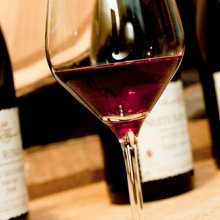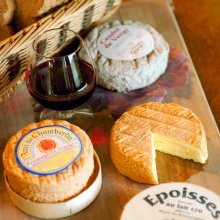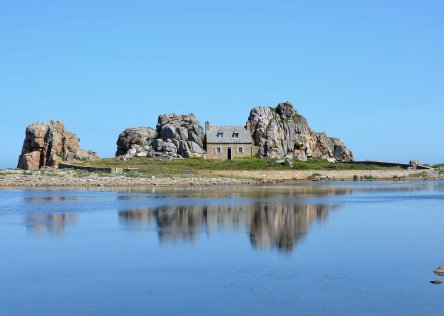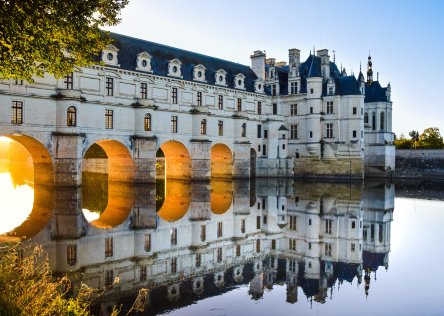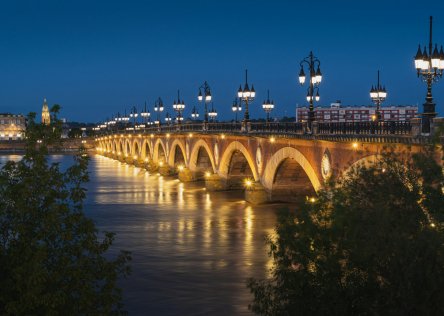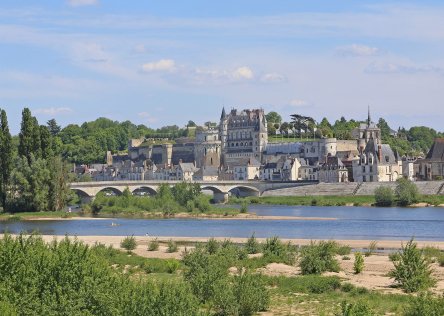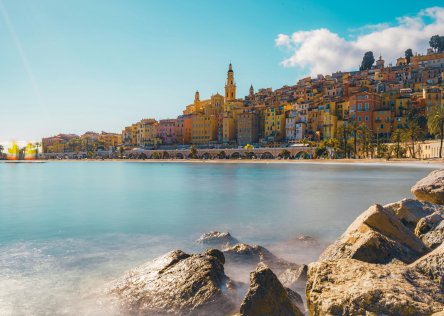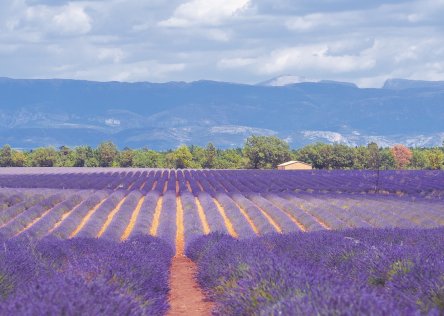If you've never studied French before, or your high school French is a little rusty, it’s helpful to learn a few essential French phrases before traveling to France.
This will give you more confidence finding your way around in France. You will know how to greet people politely before asking if they speak English, and it shows you're willing to make the effort, and French people will appreciate that. It might also help you make friends!
Although many French people can understand some English, they tend to find it harder to speak, so they will feel more at ease if you show your willingness to try to speak French first. This way, you show that you're all in the same boat!
If you have booked one of our France vacation packages, you will receive a personal guidebook specific to your trip that includes all the phrases below - and much more!
How to improve your French pronunciation
Before we get started with the phrases you’ll need for your France road trip, you'll want some guidance on French pronunciation. We like this video from TakeLessons.com on how to do a French accent. The teacher even explains the shape you need to make with your mouth to achieve the French accent!
Video: TakeLessons.com
Essential French phrases
Now you’ve got some pointers on French pronunciation, you’ll be ready to practice. If you don’t learn anything else in French, make a point of learning to say these essential French phrases. We have included the phonetic pronunciation to help you know what these sound like. Below, we give a list of apps which will also help you with pronunciation.
- Hello - Bonjour - / bohn-zhoor /
- Goodbye - Au revoir - / oh-rev-vwha /
- Excuse me - Excusez-moi - / ex-koo-say mwa /
- I don’t speak French - Je ne parle pas français - / Zhe ne parl pah frahn-say /
- Do you speak English? - Parlez-vous anglais? - / par-lay voo ahn-glay /
- I don’t understand - Je ne comprends pas - / Zhe ne cohmp-ron pas /
- Please - S’il vous plaît - / seel-voo-play /
- Thank you - Merci - / mare-see /
- Yes - Oui - / we /
- No - Non – / noh /
- My name is... - Je m’appelle... - / Zhe mah-pel /
- You’re welcome - Pas de quoi - / Pah-de-kwah /
Other useful phrases and asking for clarification
If you are struggling to understand someone, ask them to speak more slowly or to write things down.
- Could you speak more slowly please? - Pourriez-vous parler plus lentement? - / puri-ay voo par-lay plu lontamon? /
- Could you repeat that, please? - Pourriez-vous répéter, s’il vous plait ? - / puri-ay voo reh-peh-tay, seel voo play? /
- Could you write that down for me, please? Pourriez-vous l’écrire, s’il vous plait? - / puri-ay voo leh-creer, seel voo play? /
If you have a hard time memorizing a new language, you may check this method to learn some French phrases.
Getting around and asking for directions
When approaching someone you don't know, it's good practice and etiquette to start out with "Excusez-moi Madame/Monsieur" followed by "parlez-vous anglais?" or another question if you feel confident enough.
- Where? - Où? - / Oo ? /
- Where is…? - Où se trouve? Où est... ? - / oo-ce-troove / oo eh /
- Where is the train station? - Où est la gare? - / oo eh la gahr? /
- Where are the toilets ? - Où sont les toilettes? - / oo son les twa-let? /
Phrases and vocabulary for shopping in France
Sales assistants in stores normally won't greet and approach you as they do in other countries. This is because they think it's better not to bother you, for you to browse in peace and take your time. They trust that you will ask them for help when you need it. When you do need help, make sure you greet the sales assistant first with "Bonjour Madame!" or "Excusez-moi Monsieur...?" and then maybe "Parlez-vous anglais?", before explaining what you need. It helps break they ice and they're likely to be more willing to help you!
- Open - Ouvert - / oo-vehr /
- Closed - Fermé - / fair-may /
- I would like... - Je voudrais... - / Zhe voo-dray /
- How much is it? - Combien ça coûte? - / Cohm-by-en sah coot /
- May I try it on? - Puis-je l’essayer - / Pwee zhe leh-say-ay /
- I’ll take it - Je le prendrai - / Zhe le prawn-dray /
- Store - Le magasin - / le mah-gah-zahn /
- A dress - La robe - / la rob /
- A skirt - La jupe - / la zjoop /
- A shirt - La chemise - / la shem-eez /
- Pants - Les pantalons - / pahn-ta-lon /
- Shoes - Chaussures - / show-seh /
- Socks - Chaussettes - / show-set /
Numbers in French
When it comes to prices and saying how many bottles of Burgundy you'd like to buy, it can be helpful to be familiar with the numbers in French. Below we have given some of the numbers from 1-100 and their phonetic spelling, to help with your pronunciation. Click on the image below for a YouTube video which will teach you how to say the French numbers, and help you to practice!
- 1 - un - / uhn /
- 2 - deux - / deh /
- 3 - trois - / twah /
- 4 - quatre - / kahtr /
- 5 - cinq - / sank /
- 6 - six - / sees /
- 7 - sept - / set /
- 8 - huit - / wheet /
- 9 - neuf - / nuhf /
- 10 - dix – / dees /
- 20 – vingt – / vahnt /
- 30 – trente - / tront /
- 40 - quarante - / kah-ront /
- 50 - cinquante - / sankont /
- 60 - soixante - / swah-sont /
- 70 - soixante-dix - / swah-sont dees /
- 80 - quatre-vingts - / kahtr-vahnt /
- 90 - quatre-vingt-dix - / kahtr-vahnt-dees /
- 100 - cent - / sohn /
- 200 - deux cents - / deh-sohn /
- 500 - cinq cents - / sank-sohn /
- 1000 - mille – / meel /
Phrases for eating out in restaurants
In the cities, it is common for waiters to speak a little English, but they will appreciate it if you make the effort to greet them and order food in French.
In small French villages, it is unlikely that waiters will speak English, so keep your essential French phrases close by. You can print them out, or you can copy and paste them into a notes app.
Or, if you're on one of our self drive tours of France, you will only need to refer to the essential phrases section of your France Just For You guidebook.
- Waiter - Monsieur/Madame - / m’syhur / mah-dam / (Do not say “garçon.“ It’s considered a bit of an insult)
- I’ll have - Je prendrai - / zhe prawn-dray /
- Do you have...? Avez-vous...? - / ah-vay voo /
- The check - L’addition - / lah-di-shyon /
- A cup - Une tasse - / oon tahs /
- A glass - Un verre - / uhn vehr /
- A fork - Une fourchette - / oon foor-shet /
- A spoon - Une cuillère - / oon kuy-ehr /
- A knife - Un couteau - / uhn koo-toh /
- Some salt / pepper - Du sel/poivre - / dew sehl/pwahv /
- Appetizers - Les entrées - / lays-on-tray /
- Main courses - Les plats - / lay plah /
- Desserts - Les desserts - / lay day-ser /
French phrases you’ve been saying your whole life
Relations between the British and the French go way back. Our royal families would inter-marry. We fought wars against one another. Sometimes we invaded each other. The two cultures have been exposed to one another for so long that the English language has inevitably taken a lot of expressions from French. You may have said these things regularly without even realizing you’re speaking French!
- Déjà vu - already seen.
This is a grammatical structure in French, as in Je l’ai déjà vu (I’ve already seen it). It can also disparage a style or technique that has already been done, as in Son style est déjà vu => His style is not original. In English, déjà vu refers to the scientific phenomenon of feeling like you have already seen or done something when you’re sure that you haven’t: a feeling of déjà vu = une impression de déjà vu.
- Fiancé, fiancée - an engaged person.
Note that le fiancé refers to a man and la fiancée to a woman.
- Force majeure - greater force.
This refers to superior/greater force, or to an unexpected or uncontrollable event, sometimes called “an act of God”, like a tornado or earthquake.
- Je ne sais quoi - I don’t know what.
This is used to indicate a ‘certain something’, as in “I really like Laura. She has a certain ‘je ne sais quoi’ that I find very appealing.”
- Joie de vivre - joy of living.
The quality in people who live life to the fullest. A wonderful example of this is the French film ‘Amelie’. It’s about a young French woman who always tries to enjoy the small things in life and bring joy to the lives of others.
- Mardi gras - fat Tuesday
- Oh là là - oh dear.
This is usually misspelled and mispronounced “ooh la la” in English, when it is usually used when someone is expressing pleasant surprise or appreciation. In French, we use it to express unpleasant surprise, disappointment or shock.
- Petite - small, short.
It may sound chic, but petite is simply the feminine French adjective meaning “short” or “small”.
- Rendez-vous - go to.
In French, this refers to a date, informal meeting or an appointment (literally, it is the verb se rendre [to go] in the imperative).
- Savoir-vivre - to know how to live.
This is about knowing how to behave well in society, being polite and displaying good manners and etiquette.
- Tête-à-tête - head to head.
A private discussion or visit with another person
- Touché - touched.
This expression was originally used in fencing, and still is. Nowadays, it tends to mean the equivalent of “you got me!” or “you got me back!”
- Voilà! - There it is!
In English, it is sometimes misspelled as “voilá” or “violà.
- Dégustation - tasting
The French word simply refers to the act of tasting, while in English “degustation” is used for a tasting event or party, as in wine or cheese tasting.
- Vive la France - (long) live France.
Basically this is the French equivalent of saying “God bless America”. Note that it’s vive la France; “viva” is Spanish, not French.
French Idioms
Idioms are phrases or expressions that are very particular to a language and when translated literally, don't mean the same thing in another language. In English, for example, you might say that something easy is 'a piece of cake'. But to someone learning English, they would have no way of associating this with something being easy. Even with a common expression like 'What's up?', nothing about the literal translation would suggest it means 'How are you?' or 'What's wrong?'.
Once you've mastered the essential French phrases and feel confident having a basic conversation in French, why not try out some of the idioms in this video? Your French hosts and friends will be very impressed!
Apps for learning French

-
Duolingo
Fun and free, Duolingo breaks everything down into its constituent parts – grammar, vocabulary, topics – and uses fun exercises and levels so you can work your way up and learn while barely realising you’re studying French! Each lesson includes a variety of speaking, listening, translation, and multiple choice challenges. And it’s easy to play while you’re commuting to work, if you’re on a flight or waiting in line. A great app for beginners French.
-
Fluent U
In their words, ‘FluentU is French Immersion Online’. FluentU takes online videos of French songs, movies, commercials and many more verticals, adds subtitles, and turns them into learning experiences. This is great exposure to French culture, and very helpful for practicing your French listening and comprehension skills. It will also help you get used to the French accent!
-
Memrise
This is a great app for learning new vocabulary by playing games. In their words, it’s ‘Learning, made joyful’. Well, we love an app which adds a bit of ‘joie de vivre’ to learning French! Memrise is a user-generated learning platform which uses flashcards as memory aids. Language teachers often create their own vocab games for their students to do as homework, to make it more interesting and give them more motivation to learn.
-
Busuu
This takes the form of a language learning course and is based on the internationally-recognized Common European Framework of Reference for Languages (CEFR). Busuu is very comprehensive in the topics it covers, and in its exercises designed around the four language learning skills - speaking, writing, listening and speaking. It also has an active community of users to help you practice speaking French.
-
VIDALINGUA
Learn French + by Vidalingua is the fastest way to conversing with the locals on your next trip to France. It provides 101 useful lessons and over 3,000 interactive exercises to help you speak like a boss! If you want to build your vocabulary, try French Translator & Dictionary + for free on your iPhone or Android. In addition to a comprehensive dictionary and phrase translator, you will find a verb conjugator, word quiz and flashcards.
Other popular language learning apps are Babbel and Rosetta Stone. There are many other free apps if you type ‘learn French’ into the Apple or Google Play Store.
All of these essential French phrases (and more!) are included in the unique guidebooks that we produce for each of our self drive tours.
Is France on your travel bucket list? Or maybe you've visited before but would like to explore France independently by car now, at your own pace.
Browse our self guided France tour packages or contact trip planners Emilie, Laura and Clélia to find out more!
We hope this has helped you prepare for your trip to France!




